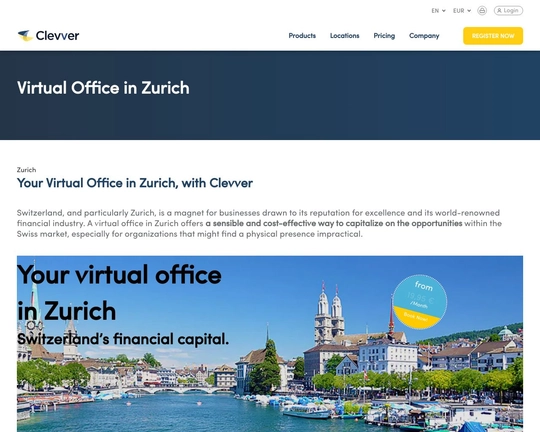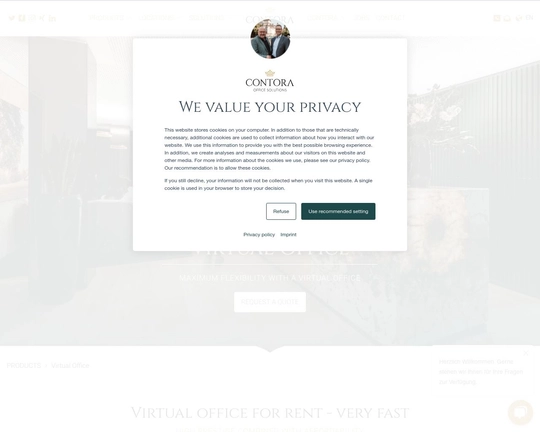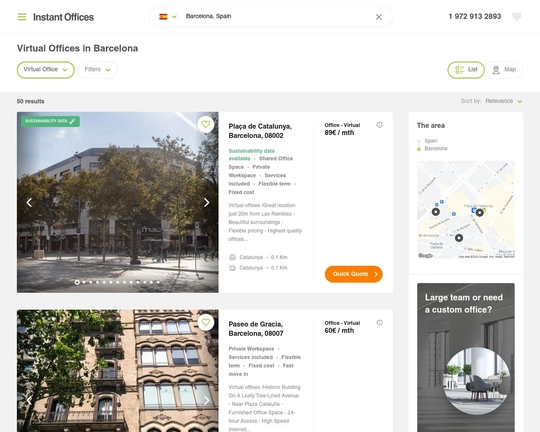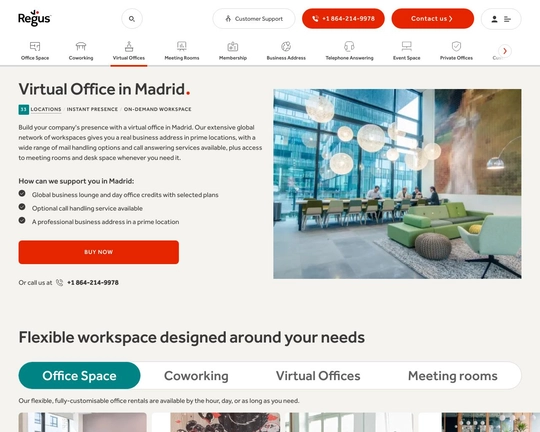What is a virtual office?
A virtual office is a service designed to provide businesses with the benefits of a professional office environment without the need for a physical space. This innovative solution allows companies to establish a presence in prestigious locations, manage business communications, and access essential office-related services, all while operating remotely. Whether you’re a startup, a freelancer, or an established company, a virtual office offers the flexibility and resources needed to maintain a professional image and streamline operations.
At Virtueelkantoor.com, we offer comprehensive virtual office solutions tailored to your business needs. With our services, you can enjoy the benefits of a prestigious business address, professional call handling, and access to meeting rooms in prime locations. Our flexible packages are designed to grow with your business, ensuring that you always have the support you need.
But how do you know which virtual office provider is right for you? To help you make the best choice, we’ve provided detailed comparisons below. These comparisons will guide you through the top virtual office options, highlighting the features, benefits, and pricing of each provider, so you can select the solution that perfectly fits your business needs.
- Find the best virtual office providers in Amsterdam with Virtueelkantoor.com, offering expert comparisons and reviews.
- Enjoy a prestigious business address, professional call handling, and access to meeting rooms in prime Amsterdam locations.
- Transparent pricing and tailored recommendations ensure you get the best virtual office solution for your business needs.
- Staete Vrijdaggevoel.be offers comprehensive virtual office services in Antwerp, including a professional business address, mail handling, and call answering.
- Benefit from flexible service packages tailored to your business needs, with access to meeting rooms in prime Antwerp locations.
- Compare Staete Vrijdaggevoel.be with other top providers to find the best virtual office solution for your company.
Read more »
- Capital Office offers prestigious virtual office services in London, including a prime business address, professional call handling, and secure mail management.
- Benefit from flexible packages that cater to startups and established businesses alike, all while protecting your privacy and enhancing your brand’s credibility.
- Capital Office provides affordable meeting rooms in London’s EC1 district, complementing your virtual office setup with professional spaces for client interactions.
- Clevver provides a prestigious virtual office address in Zurich, enhancing your business’s reputation and credibility.
- Enjoy fully digital and secure mail handling, local phone number services, and the option to set up a local Swiss bank account.
- Clevver’s scalable and modular services ensure that your virtual office grows with your business, keeping costs under control.
- Companow offers a premium virtual office service in Paris, providing a prestigious business address and comprehensive support services.
- Benefit from cost savings, professional call handling, and access to fully equipped office spaces as needed.
- Companow’s services include company formation, local banking, accountancy, trademark registration, and visa assistance.
- Contora.de offers prestigious virtual office solutions in Berlin, combining high prestige with affordability.
- Benefit from flexible office services, including a professional business address, call handling, and scalable office space options.
- Enhance your business image and minimize costs with a virtual office tailored to your specific needs.
- Instant Offices offers flexible virtual office solutions in Barcelona, providing a prestigious business address, dedicated phone services, and access to meeting rooms.
- Benefit from comprehensive mail handling, global coworking options, and scalable services tailored to your business needs.
- Ideal for digital nomads, freelancers, and professionals seeking a cost-effective way to maintain a professional presence in Barcelona.
- Office Club offers prestigious virtual office services in Milan, providing a distinguished business address and comprehensive mail handling.
- Enjoy flexible workspace options, including high-quality offices and conference rooms, available on a daily or monthly basis.
- Customize your virtual office package with additional services and take advantage of a professional community environment.
- Regus offers prestigious virtual office services in Madrid, including a prime business address, professional call handling, and secure mail management.
- Benefit from flexible packages that cater to businesses of all sizes, from startups to multinational companies.
- Regus provides global reach with over 4,000 locations worldwide, making it easy to establish a business presence in multiple markets.
Key services provided by virtual offices:
-
Professional business address:
A virtual office gives your business a prestigious address in a prime location, which can be used on your website, business cards, and official documents. This enhances your company’s credibility and appeal, especially if you’re targeting clients in specific regions. -
Mail handling and forwarding:
Virtual offices manage your business mail, receiving and forwarding it to you, no matter where you are. Some providers even offer digital mail scanning services, allowing you to access your mail online instantly. -
Phone answering services:
Many virtual office providers offer dedicated phone numbers and professional call answering services. Calls are answered in your company’s name and can be forwarded to your personal phone, ensuring you never miss an important call. -
Meeting and conference rooms:
Although you don’t have a physical office, many virtual office providers give you access to meeting and conference rooms in their locations. This is perfect for client meetings, team collaborations, or any event where a professional environment is required. -
Administrative support:
Some virtual office packages include access to administrative support services such as secretarial assistance, appointment scheduling, and more. This ensures that your business runs smoothly, even without a physical office. -
Flexible workspace solutions:
Some virtual offices offer hot desking or coworking spaces, where you can work in a professional environment when needed. This is an excellent option for those who occasionally need a workspace outside of their home office.
Who is a virtual office suitable for?
Virtual offices are incredibly versatile and cater to a wide range of businesses and professionals. Here’s who can benefit most from using a virtual office:
-
Freelancers and solopreneurs:
Freelancers and solopreneurs often work from home or on the go, which can make it challenging to present a professional image to clients. A virtual office provides a prestigious business address, professional call handling, and access to meeting rooms, allowing these professionals to maintain a high level of professionalism without the overhead of a physical office. -
Startups and small businesses:
Startups and small businesses can greatly benefit from a virtual office as it allows them to establish a business presence in a prime location without the significant costs associated with leasing office space. This is particularly useful in the early stages of growth, where every dollar counts, and the flexibility to scale services as the business grows is a major advantage. -
Remote reams and distributed companies:
Companies with remote teams or a distributed workforce can use virtual offices to centralize their operations. By having a single business address and consistent communication channels, these companies can present a unified image to clients and partners, even if their employees are spread across different regions or countries. -
Expanding vusinesses:
Businesses looking to expand into new markets often use virtual offices to establish a presence in different cities or countries. This allows them to test the waters in a new market without the risk and expense of opening a physical office. A virtual office gives them a local address and phone number, helping to build trust with local clients and partners. -
International vusinesses:
For international companies, a virtual office can provide a foothold in key global markets. By having a local address and phone number in major cities around the world, these businesses can operate globally while maintaining a localized presence, which is essential for building relationships and trust in different regions. -
Digital nomads:
Digital nomads, who work while traveling the world, benefit greatly from virtual offices. They can have a consistent business address and professional services regardless of where they are. This setup allows them to run their business seamlessly while enjoying the flexibility of their lifestyle. -
Professionals seeking privacy:
For professionals who work from home but want to keep their home address private, a virtual office is an ideal solution. It offers the use of a separate business address for official communications, protecting personal privacy while maintaining a professional front.
How to choose the right virtual office provider
Selecting the right virtual office provider is crucial to ensure that your business gets the most out of its virtual office services. Here are some factors to consider when making your choice:
-
Location of the virtual office:
The address provided by your virtual office should be in a prestigious or relevant location that aligns with your business goals. Whether you’re looking to impress clients with a central city address or establish a local presence in a specific market, the location can significantly impact your business image. -
Range of services offered:
Different providers offer different services, so it’s important to assess what’s included in your virtual office package. Are mail forwarding and scanning services part of the deal? What about phone answering and meeting room access? Make sure the provider offers the services that align with your business needs. -
Pricing and packages:
Virtual office services come at various price points, depending on the location, services, and additional features. Compare pricing and packages to find one that offers the best value for your business. Keep in mind that the cheapest option may not always be the best, especially if it lacks essential services. -
Flexibility and contract terms:
Look for providers that offer flexible terms, such as month-to-month contracts or the ability to upgrade or downgrade services as needed. This flexibility is particularly important for growing businesses or those with fluctuating needs. -
Reputation and reviews:
Research the reputation of the virtual office provider. Look for reviews and testimonials from other businesses that have used their services. A provider with a solid track record of reliability and professionalism is likely to offer better service. -
Customer support:
Good customer support is essential, especially if you rely on the provider for critical services like mail handling or phone answering. Check if the provider offers responsive and helpful customer service that can quickly address any issues that arise.
The future of virtual offices: trends and predictions
1. The rise of remote work
The shift towards remote work has been one of the most significant trends in recent years, accelerated by global events like the COVID-19 pandemic. As more companies embrace remote work as a permanent or hybrid model, the demand for virtual office services has surged. Virtual offices allow businesses to maintain a professional presence without requiring employees to be physically present in an office. This flexibility is especially appealing to companies that want to attract top talent from around the world, reduce overhead costs, and offer employees the ability to work from anywhere.
2. Technology integration
Advancements in technology are playing a crucial role in shaping the future of virtual offices. AI-driven virtual assistants are becoming more sophisticated, capable of handling complex administrative tasks, managing schedules, and even interacting with clients on behalf of the business. Enhanced cybersecurity measures are also critical, ensuring that businesses can operate securely in a virtual environment. Virtual reality (VR) and augmented reality (AR) are emerging technologies that could revolutionize virtual office setups by offering immersive meeting experiences, virtual tours of office spaces, and interactive collaboration tools.
3. Sustainability
Virtual offices contribute significantly to a more sustainable business model. By reducing the need for physical office spaces, businesses can decrease their carbon footprint associated with commuting, energy consumption, and resource use. Fewer physical offices mean less waste and lower energy usage, aligning with the growing trend towards environmentally conscious business practices. Companies that adopt virtual offices are not only saving costs but also making a positive impact on the environment.
4. Globalization
Virtual offices are breaking down geographical barriers, enabling even small businesses to operate on a global scale with minimal investment. With a virtual office, a company can establish a presence in key international markets without the need for expensive real estate or local staff. This globalization trend is empowering startups and small businesses to compete with larger corporations by providing them with the tools and services needed to reach customers and partners worldwide. As a result, virtual offices are becoming an essential component of a modern, globally connected business strategy.
Common misconceptions about virtual offices
1. "Virtual offices are only for small businesses"
One common misconception is that virtual offices are only suitable for small businesses or freelancers. In reality, companies of all sizes can benefit from virtual office services. Large corporations use virtual offices to establish a presence in new markets, provide remote working solutions for their employees, and reduce operational costs. Whether you’re a sole proprietor or a multinational enterprise, a virtual office can provide the flexibility, professionalism, and cost savings needed to enhance your business operations.
2. "Virtual offices are not professional"
Another myth is that virtual offices lack the professionalism of traditional office spaces. In fact, many virtual office providers offer high-quality services that often exceed what small physical offices can provide. These include prestigious business addresses in prime locations, professional phone answering services, mail handling, and access to meeting rooms in top-tier office buildings. Far from being less professional, virtual offices can elevate a company’s image by associating it with a desirable location and offering premium services.
3. "You can’t network with a virtual office"
Some believe that using a virtual office limits networking opportunities, but this is far from the truth. Many virtual office providers host networking events, offer coworking spaces, and provide access to business lounges where you can meet other professionals. These environments are designed to foster collaboration and connection, offering plenty of opportunities to build relationships with other entrepreneurs, potential clients, and industry peers. In many cases, the networking opportunities provided by virtual offices are on par with, or even better than, those found in traditional office settings.








